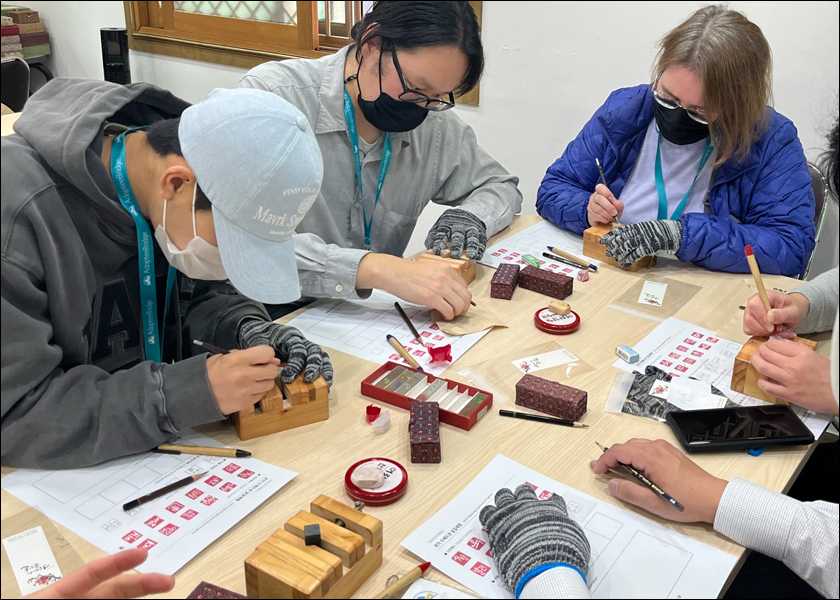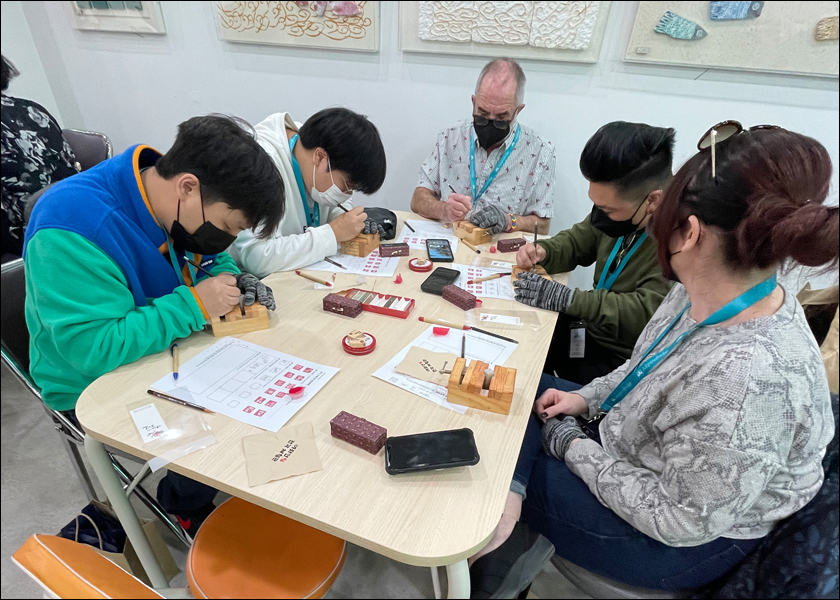Program helps young adults leaving institutions with support and life skills | By Christine Heimann (Summer 2023)

A program to introduce adult adoptees touring Korea with Korean young adults starting life in larger society after spending childhood in an orphanage is leading to benefits for both groups.
The Twin Cities adoptee mentoring and service organization AdopteeBridge, during its summer 2023 tour, partnered with the organization Love Beyond the Orphanage (LBTO) in a unique program to support these young adults. The Youth Encouragement Program, originally founded by an American adoptive mother, Amanda Greenhoe, is being developed into a larger program through a partnership between AdopteeBridge and LBTO. It targets young adults who are beyond the maximum age to live in an orphanage (referred to as “aged out” orphans), who need help of all kinds navigating the larger world, including forming a social circle, technical help with banking or housing, or starting a college education or a career.
Young adults who have recently left orphanages need friends and trusted advisors who can provide all kinds of support, from technical to emotional, and they also need many links to the rest of society, according to Hyung-mo Kim, a professor of sociology at Kyonggi University in Seoul, as reported in JoongAng Daily newspaper. Among the demographic of these aged-out young adults “Self-reliant young people who have adjusted well to society have had at least one person to contact, whether it is the director of the facility or a mentor they met separately,” Kim said. “What they need is an adult they can ask questions to and share their concerns with, a type of mentor for life.”
LBTO was founded in 2016 by a group of Korean adoptees for the purpose of supporting Korean orphans. The founders had observed the aged-out young adult orphans in Korea are not well accepted into Korean society, and that they live with the stigma and low social status of being an orphan. According to LBTO, 1,500 to 2,000 young adults annually age out of orphanages in Korea.
Greenhoe, who founded and now manages the Youth Encouragement Program, noted that the time period immediately after these young people leave institutional care is a key time. Love and support is critical as young adults launch into a time of life that brings so much transition. Sometimes, as a part of their birth search, young adults who were adopted can be reunited with young adult siblings who grew up in orphanages.
This is one of the reasons LBTO’s new program came to be. “The Youth Encouragement Program was born out of a desire I’ve seen in the Korean adoption community for adopted children and families to know the child’s birth siblings, including those living in an orphanage setting,” Greenhoe said. “Whether or not connecting with specific siblings in an orphanage is a reality in the near future — it’s very tricky at the moment — every child and young adult deserves love and support. AdopteeBridge used their connections to open up this program of pen pal support for students affected by institutional care.”
In Korean society, children placed into institutional care are technically referred to as “orphans,” but ironically, most children who grow up in orphanages, and later age out of these institutions, are not actually “orphans” in the strict sense of the word. They have families and often even parents. Children end up in orphanages not only because parents are unknown or dead, or because the parent cannot financially afford to raise the child. It may also be because the child does not fit into the rigid Korean family system, and have no place in the traditional family register (hoju). In many cases, institutionalized children are born of single mothers. These women are considered to have broken important social mores about the family bloodlines. When a child becomes an “orphan” in Korean society, that child is considered to have no bloodline at all.
The stigma of being an “orphan” leads to other ways in which these young adults are cut off from the web of connections that most young adults obtain through family, school and career ties. Being an orphaned teen also leads to mental health challenges. Between 2019 and 2021, 13 teens who left orphanages died by suicide, according to the office of Democratic Party Rep. Sun-woo Kang. There could be more, since as many as 27 teens who left orphanages during in those years could not be reached by the government officials as of 2021.
Julie Duvall, the CEO of LBTO said that because of Korean society’s continued focus on family bloodlines, “orphans” are still not readily accepted today. The stereotype of an orphan is someone who is untrustworthy, dishonest, unclean, and undisciplined, with a low IQ. Korean orphans are well aware of this stereotype, which imbues in them a deep sense of shame. For some aged-out adults, these stereotypes become a self-fulling prophecy. Many aged-out adults go to great lengths to try to hide their past as they navigate through Korean society.
Many aged-out young adults are discriminated against by prospective employers and struggle to find work, because employers are able to check family backgrounds and can discover applicants have been orphans.
Until last year, upon graduating from high school, young adults in orphanages were required to move out and find housing elsewhere. However, a law was passed last year allowing these young adults to remain in their facility until they reach the age of 24. Even at age 24, young adults may face a lot of uncertainty. Upon leaving the orphanage, they receive a small stipend from the Korean government, but no other formal support. All adult responsibilities immediately transfer to them. The social and technical support of a group like LBTO is key to young adults going through this transition period.
LBTO has been providing numerous services and programs for these young adults. Primarily, the organization provides educational scholarships and holds holiday-related social events. Currently, LBTO offers 20 scholarships. As of this year, more than 60 students have participated in LBTO’s scholarship program. One recipient is currently pursuing her master’s degree in social work, and another is preparing to enter a doctoral program at Louisiana State University.
In addition to educational scholarships, LBTO hosts holiday events such as Lunar New Year and Chuseok. In Korea, such holidays are strictly family events, and young adults with no family need other activities to do on these important days. According to Duvall, “In fact, holidays often only serve to remind them that they do not have families. We seek to help remedy this by hosting events in a fun, traditional, family-like atmosphere. During these events, we encourage these young adults to get to know one another in order to foster and grow a greater supportive network.”

During AdopteeBridge’s 2022 Fall Birthland Tour, tour participants were able to interact with some of the LBTO Encouragement Program participants. After a brief introduction at the hotel, the tour participants and LBTO young adults split into small groups and headed to the Insadong neighborhood, where there are many restaurants and hangouts, as well as many shops of artists and craftspeople. They did an activity together to create their own Korean name stamp (dojang), and had some free time to get to know one another.
Two of the tour participants spent time with a young man (called DB to protect his anonymity) from the Encouragement Program. One of the tour participants remarked, “This was such a poignant opportunity to have two diverging life experiences, connected by the common thread of relinquishment, to interact and share experiences and challenges that their respective lives have presented them. As an adoptee I’ve wondered what life [in Korea] could have been like. Meeting DB gave me a tiny glimpse of that experience. In the same way I hope that, by meeting me, DB was able to take away a similar experience.”
The relationships formed during the Encouragement Program help provide emotional support and foster new friendships for all involved. It also gives the LBTO adults a chance to improve their English skills.
Children growing up in orphanages understandably have difficulty developing trusted relationships. As a result, they commonly suffer from loneliness, depression, lack of motivation, and lack of self-worth during childhood as well as adulthood. They often have no one with whom to celebrate birthdays, holidays, graduation days, and other important milestones.
To fill this important role, the LBTO has developed a system to assign a formal mentor, called an “encourager” to interested program participants. The encourager provides emotional support and gives their young “encouragees” a sense of validation. Knowing someone who is interested in their well-being fills an important need for these young adults. Since the program began, there has been much evidence that this mentoring connection has been helpful. One “encouragee” even gained enough confidence to move to Canada to study English.
LBTO is actively recruiting more encouragers for its Youth Encouragement Program participants. The commitment cost is $25/year, and requires a Zoom meeting for introductions, followed by ongoing texting or FaceTime calls as needed and available. A minimum of monthly check-ins between paired participants is preferred.
For further information on the Youth Encouragement Program, contact Amanda Greenhoe: amanda@adopteebridge.org. AdopteeBridge has a website at: adopteebridge.org. More information about Love Beyond the Orphanage is at: lovebeyondtheorphanage.org


